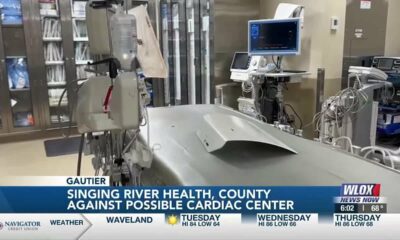Mississippi Today
The Christian argument for Medicaid expansion
Note: This editorial anchored Mississippi Today's weekly legislative newsletter. Subscribe to our free newsletter for exclusive access to legislative analysis and up-to-date information about what's happening under the Capitol dome.
The bishop of the Catholic Diocese of Jackson is glued to the legislative debate over Medicaid expansion.
The leader of more than 50,000 Catholics in 65 Mississippi counties, Bishop Joseph Kopacz has good reason to tune in. Priests in his diocese serve poverty-gripped Mississippi communities where so many people cannot afford basic health care. Church leaders regularly visit the state's hospitals and see firsthand how dire the financial crisis has become for hospitals struggling to cover the costs of serving uninsured patients. Kopacz himself has served on the board of St. Dominic Hospital in Jackson, which has been forced to eliminate numerous services in recent years as its leaders struggle to balance its budget.
As lawmakers for the first time seriously consider Medicaid expansion, which experts say would provide health insurance to hundreds of thousands of Mississippians and save the state's hospitals millions each year, Kopacz is one of many faith leaders watching closely.
“This opportunity is golden,” Kopacz told me in an interview on Holy Thursday. “All the factors are in place to bring this about for the common good and the real care for the people of our state. It's too important to ignore when we know the need is there, and we know there's a real financial capacity to implement this in our state.”
I wanted to hear Kopacz's thoughts about Medicaid expansion for a few reasons. First, he and others at the diocese have been front-and-center as a coalition of faith leaders work to get expansion — long believed to be a pipe dream in conservative Mississippi — across the finish line this session. Continuing a long and impactful legacy of social activism in Mississippi, Catholic, Protestant and Jewish clergy have led calls this session for lawmakers to expand Medicaid.
Second, we've heard a cascade of cries lately from opponents of expansion — some self-proclaimed conservatives — about the dangers of using Christian faith principles to advocate for such a policy change. “Jesus is not a political weapon to be turned on our political enemies and Scripture does not exist to be twisted to fit our political agenda,” one commentator wrote recently. I thought calling in an actual biblical expert might be helpful to us all.
Third, two of the most important Republican leaders at the table for this debate — Lt. Gov. Delbert Hosemann and Sen. Kevin Blackwell — are devout Catholics. Hosemann and Blackwell have led the Senate's development of an expansion plan, which experts say isn't considered expansion at all. Their plan, if implemented, would insure far fewer Mississippians than traditional expansion, would leave hundreds of millions of federal dollars at the table, and would likely never go into effect at all because of a strict work requirement that the federal government will not approve. And in passing their plan, the two Senate leaders tossed aside an earlier House proposal that would have actually gone into effect, insured hundreds of thousands more Mississippians, and drawn down the full $1 billion-plus of annual federal funds available.
READ MORE: Senate passes pared-down Medicaid expansion plan with veto-proof majority
Kopacz, ever humble and mild-mannered, declined to speak directly about Hosemann and Blackwell during our interview. But he did speak very specifically about aspects of the two Senate leaders' plan.
“The work requirement (under the Senate plan) could make this unnecessarily insurmountable,” Kopacz said. “It would be really unfair and unjust not to be able to move this plan forward because of too rigid of an approach to work. And look, I certainly embrace work. Part of our Catholic social teaching demands that of us. Work is a big part of being a productive citizen. But so many people cannot work at all for various reasons. I understand it's important to many lawmakers, but the work requirement cannot be absolute. It could just completely derail the whole effort.”
Several times in our interview, Kopacz referenced Catholic social teaching. Being a Presbyterian preacher's kid with a strong tendency to go down theological rabbit holes, I wanted to know more about that and did some reading. What I found was an extraordinary distillation of the Christian argument for expansion — and a clear set of principles for why Kopacz is so strongly advocating for it in this moment.
There are seven themes of Catholic social teaching, and all but one of them have direct bearing on Mississippi's current debate about Medicaid expansion. This literature is not biblical scripture, of course, but the U.S. Conference of Catholic Bishops base their writing directly and clearly in biblical passages.
Italicized text is pulled directly from the bishops' text, followed by quotes from Kopacz that add further context.
Life and dignity of the human person. The Catholic Church proclaims that human life is sacred and that the dignity of the human person is the foundation of a moral vision for society.
“Another way of appreciating that is a real integral pro-life vision for our communities and our state would be all that helps life to flourish. Health care is a very important part of this,” Kopacz said.
Option for the poor and vulnerable. A basic moral test is how our most vulnerable members are faring. In a society marred by deepening divisions between rich and poor, our tradition recalls the story of the Last Judgment and instructs us to put the needs of the poor and vulnerable first.
“There's economic opportunity in this state, but often where it falls short is when people haven't had necessarily the best conditions educationally or certainly with health care,” Kopacz said. “Poverty can really hurt a person's well-being, and that's why something like Medicaid expansion is so important. So many people in this state are hurting. Medicaid expansion can help.”
Rights and responsibilities. The Catholic tradition teaches that human dignity can be protected and a healthy community can be achieved only if human rights are protected and responsibilities are met.
“Health care is a right, and it should not be denied when it can be provided,” Kopacz said, echoing decades of Catholic leadership writings on the matter. “It's not a political issue, it's a right.”
The dignity of work and the rights of workers. The economy must serve people, not the other way around. Work is more than a way to make a living; it is a form of continuing participation in God's creation. If the dignity of work is to be protected, then the basic rights of workers must be respected – the right to productive work, to decent and fair wages, to the organization and joining of unions, to private property, and to economic initiative.
“Work is a big part of being a productive citizen. I'm all for it,” Kopacz said. “However, there are just too many pieces to life in terms of health. Situations of loss in people's lives, whatever could happen that knocks people on their heels for a long time. There are just too many complex areas of life that cannot be overlooked right now. I believe a vast majority of people are working and will work. But not everyone can.”
Perhaps non-Catholic lawmakers and readers of this column aren't moved by the bishop's words and some papal and conciliar documents. For those folks, here are just a handful of biblical scriptures cited by Christian leaders advocating for Medicaid expansion at the Capitol this session: Matthew 25:40; Luke 10:35; Proverbs 11:25; Romans 13:10; John 13:34-35; and Luke 6:20.
Meanwhile, Kopacz and other clergy are planning at least one more Capitol rally as Senate and House leaders begin trying to hammer out an expansion plan in the conference committee process.
The way these leaders see it, they aren't twisting scripture for political purposes. They're letting it guide their advocacy for a transformative policy that would save lives and help so many Mississippians in need.
“There seems to be a groundswell of desire that there be a more just reality in our state for people in need of health care,” Kopacz said. “I do think in a way there's no turning back here. To wait another year is really just — people are in need now. The people of Mississippi, in the last several years, have indicated they support it. I'm just hoping the lawmakers can make this a reality.”
PODCAST: Inside faith leaders' push to expand Medicaid in Mississippi
This article first appeared on Mississippi Today and is republished here under a Creative Commons license.
Mississippi Today
Law enforcement officers’ oversight bill heads to governor’s desk
The Mississippi Senate passed legislation Monday to give the state's officer certification board the power to investigate law enforcement misconduct.
House Bill 691, the revised version of which passed the House Saturday, is now headed to the desk of Gov. Tate Reeves.
The bill comes in the wake of an investigation by the Mississippi Center for Investigative Reporting at Mississippi Today and The New York Times into sheriffs and deputies across the state over allegations of sexual abuse, torture and corruption. The reporting also revealed how a “Goon Squad” of officers operated for two decades in Rankin County.
Public Safety Commissioner Sean Tindell said if the governor signs the bill, he anticipates the Mississippi Board on Law Enforcement Officer Standards and Training would hire a few investigators to investigate matters and make recommendations.
The bill would enable the board to establish a hearing panel on any law enforcement officer “for whom the board believes there is a basis for reprimand, suspension, cancellation of, or recalling the certification of a law enforcement officer. The hearing panel shall provide its written findings and recommendations to the board.”
In addition, deputies, sheriffs and state law enforcement would join police officers in the requirement to have 20 hours of training each year. Those who fail to get such training could lose their certifications.
Other changes would take place as well. Each year, the licensing board would have to report on its activities to the Legislature and the governor.
The bill calls for a 13-member board with the governor having six appointments – two police chiefs, two sheriffs, a district attorney and the head of the law enforcement training academy.
Other members include the attorney general, the public safety commissioner, the head of the Highway Patrol, and the presidents of the police chiefs association, the constable association, the Mississippi Campus Law Enforcement Association and the sheriff's association (or designee).
This article first appeared on Mississippi Today and is republished here under a Creative Commons license.
Mississippi Today
Legislators extend 2024 session after missing budget deadline
Legislative leaders are optimistic that they will be able to start passing bills to fund the $7-billion budget to fund state services on Tuesday.
“We will be rolling Tuesday and the day after I suppose,” said Senate Appropriations Chair Briggs Hopson, R-Vicksburg.
Late Monday the House and Senate agreed on a resolution to extend the session. Appropriations and revenue (taxes and borrowing) bills died Saturday night when House and Senate leaders could not reach agreement on a key deadline. The resolution approved Monday was needed to revive the bills.
The final day of the session was scheduled for Sunday, May 5. Now it is scheduled for May 14, but House Speaker Jason White, R-West, predicted Monday that the Legislature will finish its work this week, though leaders did concede there were still some “minor” disagreements between the House and Senate.
Under the resolution, the legislators – even though their work would be completed this week — will return on May 14 unless White and Lt. Gov. Delbert Hosemann agree not to return.
Returning on May 14 would give the Legislature the opportunity address any possible vetoes by Gov. Tate Reeves. Lawmakers can override gubernatorial vetoes with a two-thirds vote of each chamber.
Asked Monday if an agreement had been reached on the revenue bills, Senate Finance Chairman Josh Harkins, R-Brandon, who handles those proposals, said, “Gosh, I hope so. If not I am going holler a Jerry Clower for them to shoot up amongst us,” Harkins said referencing a skit by the Mississippi comic.
It took a two-thirds vote of both chambers to pass the resolution to extend the session. It passed unanimously in the House, but six members of the 52-member Senate voted no. Without the resolution, it most likely would require a special session called by Gov. Tate Reeves to pass budget bills and revenue bills.
This article first appeared on Mississippi Today and is republished here under a Creative Commons license.
Mississippi Today
Lawsuit in death of man following Jackson police encounter may be headed to trial
The family of George Robinson plans to move forward with a wrongful death lawsuit against the city of Jackson and three former police officers after rejecting a nearly $18,000 settlement offer.
Attorney Dennis Sweet III made the intentions of Bettersten Wade, Robinson's sister, and Vernice Robinson, Robinson's mother, clear in a Thursday letter sent the day after the City Council approved a $17,786 payment to settle the family's 2019 lawsuit.
“This is more than anyone should have to endure. Much less have the City of Jackson tout the purported term of settlement as some sort of victory,” Sweet wrote in the letter. “Needless to say, no individual or party obtained a victory in this matter.”
The financial terms of the settlement and plaintiffs' identities were not supposed to be disclosed publicly and the council did not approve the settlement in executive session, Sweet said. According to Mississippi's open meeting law, any public body can enter executive session for a number of reasons, including for negotiations relating to litigation.
Sweet was not immediately available to comment Monday. Last week, he told WLBT he would take it to trial.
Council President Aaron Banks, who was also not immediately available for comment, said the settlement was freely negotiated among the parties and signed by Wade and Vernice Robinson, who had their attorneys with them, according to a Friday statement to the Clarion Ledger.
Banks disputed Sweet's claims that the city violated any terms of the settlement, such as a confidentiality agreement, saying the city didn't agree to one and that settlements are public records, according to the statement.
“The City intends to honor the agreement it reached and expects the Wade family to do so, also,” Banks said in the statement.
However, some city council members said after the meeting that they were not aware of a confidentiality agreement.
City Attorney Drew Martin declined to comment Monday.
All the parties met for mediation April 12. Sweet said that during the session, a representative from the city said it is in “financial straits and did not possess substantial funds in which to resolve Ms. Wade's claims against it.” The lawsuit complaint asked for a jury trial and damages to be determined by a jury.
Banks's statement did not address the attorney's claim about the city's finances.
Wade agreed during mediation to settle with ambulance provider American Medical Response and to allow the city to join that settlement and end litigation, according to Sweet's letter.
“Had AMR not agreed to a substantial settlement amount, Ms. Wade would not have settled with the City of Jackson,” he wrote in the letter.
The company settled for a different amount that was not disclosed, according to Sweet's letter.
As of Monday, electronic court filings for the lawsuit do not show that the judge has signed off on a settlement.
In January 2019, 62-year-old Robinson was pulled from a car and beaten by officers, leaving him with severe injuries. At the time, he was recovering from a stroke. Robinson died days later.
In 2022, former detective Anthony Fox was convicted culpable-negligence manslaughter for Robinson's death, while charges against officers Desmond Barney and Lincoln Lampley were dismissed a year earlier.
Fox was incarcerated until January when the Mississippi Supreme Court overturned his conviction and issued an acquittal, freeing him. Fox has returned to work for the Canton Police Department.
This isn't Wade's only loss and fraught experience with the city, Sweet said.
Last year, her son Dexter died after being hit by a car driven by an off-duty Jackson police officer. He was buried unidentified in the Hinds County pauper's field, despite having identification on him. His family did not know he was there until months later.
This article first appeared on Mississippi Today and is republished here under a Creative Commons license.
-
Local News5 days ago
Sister of Mississippi man who died after police pulled him from car rejects lawsuit settlement
-
Mississippi Today5 days ago
At Lake High School in Scott County, the Un-Team will never be forgotten
-
Mississippi Today2 days ago
On this day in 1951
-
Mississippi News3 days ago
One injured in Mississippi officer-involved shooting after chase
-
Mississippi News6 days ago
Viewers make allegations against Hatley teacher, school district releases statement – Home – WCBI TV
-
Mississippi News Video6 days ago
Vehicle struck and killed man lying in the road, Alcorn County sheriff says
-
Mississippi News5 days ago
Ridgeland man sentenced for molesting girl
-
Mississippi News5 days ago
Suspected Dollar General armed robber arrested in Pickens County
































